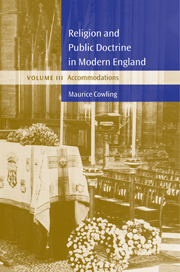Book contents
- Frontmatter
- Contents
- Foreword and acknowledgements
- Introduction
- I The Christian intellect and modern thought in modern England
- II The post-Christian consensus
- 15 Modern knowledge and the post-Christian consensus I
- 16 Modern knowledge and the post-Christian consensus II
- 17 Modern knowledge and the post-Christian consensus III
- 18 Modern knowledge and the post-Christian consensus IV
- 19 English Socialism as English religion
- 20 Literature and the post-Christian consensus
- 21 Modern knowledge and the post-Christian consensus V
- 22 Modern knowledge and the post-Christian consensus VI
- 23 Judaism and the post-Christian consensus
- III Conclusion: religion and public doctrine in modern England
- Notes
- Index of proper names
23 - Judaism and the post-Christian consensus
Published online by Cambridge University Press: 23 December 2009
- Frontmatter
- Contents
- Foreword and acknowledgements
- Introduction
- I The Christian intellect and modern thought in modern England
- II The post-Christian consensus
- 15 Modern knowledge and the post-Christian consensus I
- 16 Modern knowledge and the post-Christian consensus II
- 17 Modern knowledge and the post-Christian consensus III
- 18 Modern knowledge and the post-Christian consensus IV
- 19 English Socialism as English religion
- 20 Literature and the post-Christian consensus
- 21 Modern knowledge and the post-Christian consensus V
- 22 Modern knowledge and the post-Christian consensus VI
- 23 Judaism and the post-Christian consensus
- III Conclusion: religion and public doctrine in modern England
- Notes
- Index of proper names
Summary
Hitler will be defeated: and yet, unless the Jewish problem is faced in the light of history and with a courageous, realistic approach, it will continue to poison our lives and the minds of non-Jews. Normality must be our aim: to be no longer either ‘prodigies’ or outcasts, or both. Jews with a national consciousness and purpose must be given an honest chance to build on the foundations which they have laid in Palestine: a Jewish National State must arise there once more. … There must be a country where Jews can live, work, and amuse themselves as they please; be good, bad, great, or ridiculous: but, like all nations, among themselves, not under the eyes of strangers.
(L. B. Namier, The Jews, in The Nineteenth Century and After, November 1941, reprinted in Conflicts, 1942, pp. 134–5)One belief, more than any other, is responsible for the slaughter of individuals on the altars of the great historical ideals … the belief that somewhere in the past, or in the future, in divine revelation, or in the mind of an individual thinker, in the pronouncements of history or science, or in the simple heart of an uncorrupted good man, there is a final solution.
(Isaiah Berlin, The Two Concepts of Liberty, 1958, p. 58)The educational system in most countries requires that a child on entering school should receive religious instruction. The decision whether he will be instructed in Catholic, Protestant or Jewish dogma … depends on the hazard of [the] parents' denomination. […]
- Type
- Chapter
- Information
- Religion and Public Doctrine in Modern England , pp. 634 - 674Publisher: Cambridge University PressPrint publication year: 2001

